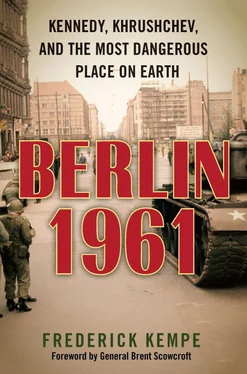The climactic Camp David meeting began badly, as Khrushchev and Eisenhower engaged in two days of acrimonious talks over everything from the threat of nuclear war (Khrushchev said he didn’t fear it) to discriminatory rules on what technology Americans could sell Moscow (Khrushchev sneered that he didn’t need low-tech U.S. help to make shoes or sausages). Eisenhower prevented a breakdown in talks when he flew his guest by helicopter to his Gettysburg ranch and presented him with one of his cattle as a gift. In return, Khrushchev invited Eisenhower and his grandchildren to visit the Soviet Union.
The following morning, Khrushchev agreed to abandon his Berlin ultimatum of the previous year in exchange for Eisenhower’s commitment that he would enter talks on Berlin’s status with the aim of achieving a solution that would satisfy all parties.
With unusual candor, Khrushchev shared with Eisenhower that he had only issued a Berlin ultimatum as “the result of the high-handed attitude of the U.S. toward the USSR, which had led the Soviets to think that there was no alternative.” He said he needed a disarmament agreement with the U.S., as it was hard enough to feed his country without having to bear the costs of an arms race. The two men then compared notes about how their military establishments were pushing them each toward ever larger arms purchases, always blaming the aggressive posture of the other country.
Talks nearly collapsed again when Khrushchev insisted on a joint communiqué to capture their agreement on Berlin negotiations, but demanded the U.S. side take out language that “there would be no time limit on them.” After a difficult exchange, Eisenhower accepted Khrushchev’s terms as long as he could mention at their joint press conference the Soviet leader’s agreement to abandon his Berlin ultimatum, which Khrushchev would confirm if the media asked.
For his part, Eisenhower agreed to what Khrushchev had most wanted: a four-power Paris Summit on Berlin and disarmament issues. For Khrushchev, the agreement immunized him against critics who argued his “peaceful coexistence” policy toward the West had been without result—and provided incontrovertible proof that his course was improving the Soviet Union’s global standing.
Elated by the U.S. trip and the prospect of a summit, Khrushchev preemptively cut Soviet armed forces by a further 1.2 million men in December, the largest-percentage reduction since the 1920s. Reports that France’s Charles de Gaulle and West Germany’s Konrad Adenauer were rolling back Eisenhower’s willingness to negotiate Berlin’s status did not dampen Khrushchev’s self-congratulatory optimism.
SVERDLOVSK, SOVIET UNION
SUNDAY, MAY 1, 1960
Just eight months after his American journey, what Khrushchev heralded as the “spirit of Camp David” exploded over Sverdlovsk in the Ural Mountains when a Soviet surface-to-air missile brought down a spy plane.
Initially, Khrushchev celebrated the incident as a triumph of Soviet anti aircraft technology and a change of luck. As recently as three weeks earlier, his air defense forces had failed to bring down the advanced, high-altitude CIA plane even though the Soviets knew exactly where it was flying. While in pursuit on that earlier occasion, a MiG-19 Soviet fighter had crashed in Semipalatinsk near a secret nuclear testing site that the U-2 plane was photographing. Two newly developed high-altitude interceptors also could not catch up to the U-2 as it collected images of the Tyumatom ballistic missile site.
Up until that point, a frustrated Khrushchev had kept the U.S. intrusions secret from the world so as to avoid having to admit Soviet military failure. Now that his forces had shot down the U-2, he gleefully toyed with the Americans by saying nothing about the incident while the CIA put out a false cover story—one it would later be forced to withdraw with embarrassment—that a weather plane had gone missing over Turkey.
Within days, however, Khrushchev recognized that the U-2 incident posed greater dangers to him than to the Americans. Political enemies whom he had neutralized after putting down the 1957 coup against him began to regroup. Mao Tse-tung publicly condemned Khrushchev’s wooing of the Americans as “communist betrayal.” Though still speaking privately, Soviet party officials and military brass more confidently questioned Khrushchev’s troop reductions. They argued that Khrushchev was undermining their ability to defend the homeland.
Years later, Khrushchev would concede to the American physician A. McGhee Harvey, a specialist who was treating his daughter, that the U-2 incident proved to be the watershed event after which he “was no longer in full control.” From that point forward, Khrushchev found it harder to defend himself against those who argued that he was too weak in the face of the militaristic and imperialist intentions of duplicitous Americans.
At first, Khrushchev tried to keep on track the Paris Summit that was scheduled to occur two weeks after the U-2 event—a meeting that he had worked so hard to organize as a crowning moment of his rule. Khrushchev told domestic critics that if they pulled out, they would only be rewarding U.S. hard-liners like CIA chief Allen Dulles, who, he argued, had ordered the flights to undermine Eisenhower’s genuine peace efforts.
Eisenhower removed Khrushchev’s last political cover at a press conference on May 11, just five days ahead of the summit. To reassure Americans that their government had acted responsibly and under his complete control, Eisenhower said he had personally approved Gary Powers’s U-2 flight—as he had with each and every one of the sensitive missions. Such risks were necessary, he said, because Soviet secrecy made it impossible to assess Moscow’s intentions and capabilities through any other means. “We are getting to the point where we must decide whether we are trying to prepare to fight a war or prevent one,” he told his national security team.
By the time he landed in Paris, Khrushchev had concluded that if he couldn’t get a public apology from Eisenhower, he would have to prompt the collapse of the Paris talks. It was politically safer for him to abandon the summit than to go ahead with a meeting that was destined to fail, and by then it also was clear the U.S. would offer none of the concessions he was seeking on Berlin.
Though Eisenhower refused to apologize in Paris for the U-2 mission, he tried to avoid a summit collapse by agreeing to stop the flights. He went an important step further and proposed an “open skies” approach that would allow United Nations planes to monitor both countries with over-flights. Khrushchev, however, could never accept such a proposal because it was only secrecy that protected his exaggerations about Soviet capabilities.
In what would be the one and only session of the summit, Khrushchev uncharacteristically stuck to the language of a prepared forty-five-minute harangue that proposed a six- to eight-month postponement of the conference so that it would resume only after Eisenhower had left power. He also withdrew his invitation for Eisenhower to visit the Soviet Union. Without forewarning the other leaders at the summit, Khrushchev then petulantly refused to attend the second session the following day. He instead retreated with Defense Minister Rodion Malinovsky to the French village of Pleurs-sur-Marne—where Malinovsky had stayed during World War II—to drink wine, eat cheese, and talk about women. Well lubricated, the Soviet leader returned to Paris that afternoon to declare the summit’s collapse.
His crowning public act came during a nearly three-hour farewell press conference at which he slammed his fist so hard on a table that it toppled a bottle of mineral water. Assuming the catcalls that followed came from West German reporters, he called them “fascist bastards we didn’t finish off at Stalingrad.” He said if they continued to heckle him, he would hit them so hard “there won’t be a squeal out of you.”
Читать дальше











